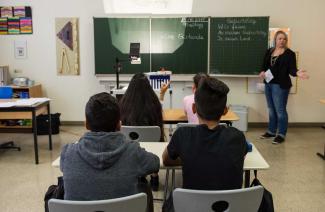Migration and education
High hurdles in German education system

In Germany, refugee children and adolescents between the ages of 7 and 15 – like all children and adolescents – are required to attend school. For those who migrate at age 16 to 18, education is not compulsory, but they can attend extra German classes and continue their education afterwards. However, compared to pupils without a migration history or other young people with immigrant backgrounds, far fewer refugees attend upper secondary education in Germany (de Paiva Lareiro, 2019). This is the stage before tertiary education, namely career-oriented high schools (Realschulen) or academic high schools (Gymnasien).
One of the most important reasons is that newly arrived refugee children can of course barely speak German. As a result, they often do not attend regular lessons, but instead so-called preparatory or welcome classes. There, they receive intensive language instruction for a maximum of two years. Not every school offers these classes, however, and pupils attending them study in a classroom where students differ markedly with regard to their age as well as language and education levels. This situation prevents pupils from realising their full potential during a decisive phase of their language acquisition. It diminishes the chances of an upper secondary school degree.
After completing their preparatory classes, pupils can take different paths depending on their age, abilities and career goals. For example, they can apply for upper secondary education in career-oriented high schools or academic high schools, or decide to pursue vocational training at a trade school. Those who do not find a training position or need further career guidance end up in so-called transition programmes. Here, young people take part in various vocational preparation schemes, but they cannot earn a degree.
According to the Bertelsmann Stiftung, an independent Germany-based foundation, young people without a German passport are at a disadvantage when searching for training opportunities. They participate in vocational preparation schemes in transitional programmes twice as often as German youth. There is an urgent need for them on the labour market, however: in 2019, the supply of vocational training positions in Germany was higher than the demand (BIBB 2020).
Confusing choices
Education policy is left up to the states in Germany, and there are no uniform, nationwide guidelines for transition programmes. Thus the offerings are vast and frequently confusing. Foreign parents and their children are often overwhelmed – as they are by the entire German education system. Many do not understand the difference between Gymnasium, Gesamtschule and Berufskolleg, nor can they make sense of the German vocational training system and its three pillars: dual training, which is divided between school and industry; purely school-based vocational training programmes; and the aforementioned transition programmes.
Therefore, some parents believe that attending university is their children’s only path to stable employment. At the same time, many do not understand that not all school degrees guarantee university admission, or that it is difficult to achieve any school degree without excellent German language skills. Bureaucratic processes also contribute to the confusion; for example, pupils must re-apply to trade schools every year. What’s more, refugee parents often have high expectations for their children’s school performance and career choices and put them under pressure. At the same time, they are typically unable to support their children, because they themselves are not yet familiar with the local education system and labour market shortly after they arrive. Conversely, older children often actually take responsibility for their parents, for instance by acting as interpreters when dealing with various authorities.
Other important aspects that impact the development of refugee children and adolescents, in addition to their living situation, their legal status and their parents’ education level, include:
- their age when they emigrated and the regularity of their previous school attendance,
- stress during their migration,
- reorientation in multiple areas of life simultaneously (language, customs, friendships, school environment),
- recognition of prior knowledge and school certificates and
- their often precarious living situation in general.
The German education system bears a special responsibility towards these young people, with regard not only to their educational, but also their social and linguistic integration. Therefore the responsible ministries should:
- allocate more resources for preparatory classes and set smaller pupil-to-teacher ratios (five to seven pupils per class, instead of 15 to 20),
- when working with parents, have greater understanding of their language barriers and lack of knowledge about the German school system,
- provide more support to pupils and their parents, regardless of their background, in the process of choosing a career path.
Furthermore, recent immigrants should be allowed to attend school after their eighteenth year with a minimum of red tape – especially if they have not graduated or their foreign transcript is not recognised. Refugees who migrated age 15 and older should also receive additional linguistic support because they have less time to prepare for the transition from school to work.
A good school education will open the door for refugees to their host country and to personal and professional development. Conversely, poor language skills, a lack of career direction and an inadequate understanding of the education system hurt their chances to participate. Because of its demographic trends, Germany needs workers from abroad. For that reason alone, German society should have an interest in integrating young refugees into its education system better than it has so far.
Sources
Bundesinstitut für Berufsbildung (BIBB): Datenreport zum Berufsbildungsbericht 2020.
https://www.bibb.de/dokumente/pdf/bibb_datenreport_2020.pdf
de Paiva Lareiro, C., 2019: Ankommen im deutschen Bildungssystem. Bildungsbeteiligung von geflüchteten Kindern und Jugendlichen. Ausgabe 02/2019 der Kurzanalysen des Forschungszentrums Migration, Integration und Asyl des Bundesamtes für Migration und Flüchtlinge, Nürnberg.
https://www.bamf.de/SharedDocs/Anlagen/DE/Forschung/Kurzanalysen/kurzanalyse2-2019-ankommen-im-deutschen-bildungssystem.html?nn=404000
Sabrina Ferraz Guarino studied linguistics and European studies with a focus on migration and integration. She is a consultant in the youth migration service of the Katholische Jugendagentur Bonn, a catholic social welfare organisation.
ferraz.guarino@gmail.com












